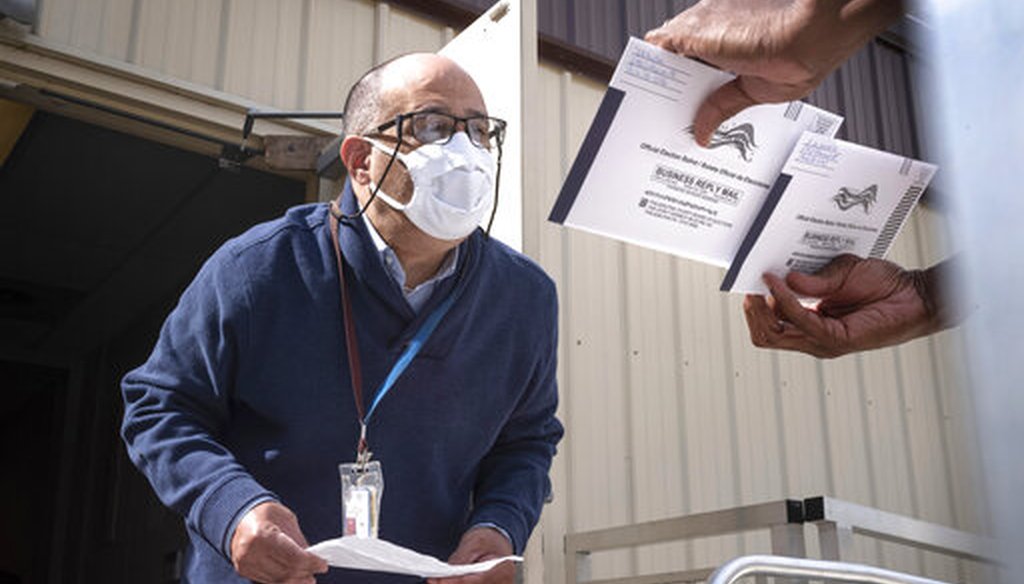Stand up for the facts!
Our only agenda is to publish the truth so you can be an informed participant in democracy.
We need your help.
I would like to contribute

In this Thursday, Oct. 1, 2020 file photo, An employee of the Philadelphia Commissioners Office examines ballots at a satellite election office at Overbrook High School in Philadelphia. (AP)
Pennsylvania rejected 372,000 ballot applications, not ballots
If Your Time is short
-
Conservative reports wrongly conflated applications for mail-in ballots with actual ballots in Pennsylvania.
-
As of mid October, Pennsylvania rejected about 372,000 applications for mail ballots, primarily because the voters had previously requested one.
Some conservative websites inaccurately reported that 372,000 mail-in ballots were rejected in Pennsylvania, conflating applications for ballots with actual ballots.
"Pennsylvania rejected 372,000 mail-in ballots, leaving many voters confused: report," stated an Oct. 18 headline on The Geller Report.
This post was flagged as part of Facebook’s efforts to combat false news and misinformation on its News Feed. (Read more about our partnership with Facebook.)
The attacks come during an election season when President Donald Trump has repeatedly tried to sow doubt about voting by mail, which has increased in many states amid COVID-19.
The Geller Report and another outlet, The Blaze, misconstrued information from an Oct. 16 ProPublica/Philadelphia Inquirer story. Charlie Kirk, Turning Point USA founder, also tweeted the misinformation, which led to his account being locked for violating Twitter rules.
ProPublica and the Inquirer reported that Pennsylvania rejected 372,000 requests for mail-in ballots, not actual ballots. (The Blaze later added an update making that distinction clear.)
"More than 90% of those applications, or about 336,000, were denied as duplicates, primarily because people who had requested mail-in ballots for the state’s June 2 primary did not realize that they had checked a box to be sent ballots for the general election, too," ProPublica/Inquirer stated. (The Philadelphia Inquirer is a PolitiFact partner.)
As of the morning of Oct. 19, almost one-third of the state’s 9 million had requested ballots.
If a voter didn’t sign the envelope, the envelope is returned to the voter with instructions about how to remedy it, said Amie Downs, a spokesperson for the Allegheny County elections office. But no ballots have been opened yet or rejected since they don’t begin to process them until after 7 a.m. Election Day.
Election officials have predicted that many mail ballots will be rejected because of the requirement that states return their ballot inside of a secrecy envelope. The number of rejected ballots could make a difference in the state that Trump won by about 44,000 votes, or less than 1%, in 2016.
RELATED: How to make sure your ballot is counted this fall
Our ruling
A Facebook post said Pennsylvania rejected 372,000 mail-in ballots.
That’s wrong. The state rejected 372,000 applications for ballots, primarily because the voters had already requested one.
We rate this statement False.
This fact check is available at IFCN’s 2020 US Elections FactChat #Chatbot on WhatsApp. Click here, for more.
Our Sources
Geller Report, Pennsylvania rejects 372,000 mail-in ballots, leaving many voters confused: report, Oct. 18, 2020
ProPublica/Philadelphia Inquirer, Pennsylvania’s Rejection of 372,000 Ballot Applications Bewilders Voters and Strains Election Staff, Oct. 16, 2020
Pennsylvania Department of State, Mail in ballot data statistics, Accessed morning of Oct. 19, 2020
U.S. Elections Project, Pennsylvania early voting statistics, Oct. 16, 2020
Los Angeles Times, ‘A really destructive scenario’: Pennsylvania could hold up outcome of presidential election, Oct. 14, 2020
Washington Post, Philadelphia election official warns ‘naked ballots’ may invalidate up to 100,000 votes, Sept. 25, 2020
SpotlightPA, Twitter thread, Oct. 19, 2020
Fox News, Charlie Kirk says he's in 'a hostage situation' with Twitter after social media giant blocks his account, October 2020
Telephone interview, Amie Downs, a spokesperson for the Allegheny County elections office, Oct. 19, 2020
Email interview, Wanda Murren, spokesperson for the Pennsylvania Department of State, Oct. 19, 2020
Browse the Truth-O-Meter
More by Amy Sherman
Pennsylvania rejected 372,000 ballot applications, not ballots
Support independent fact-checking.
Become a member!
In a world of wild talk and fake news, help us stand up for the facts.














































